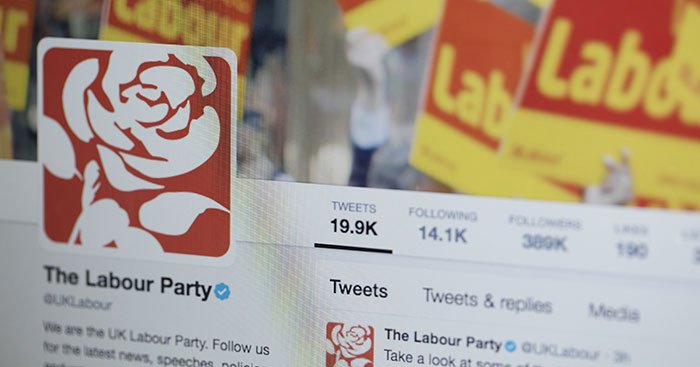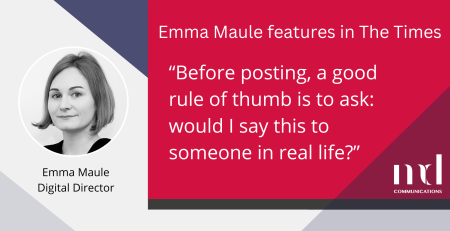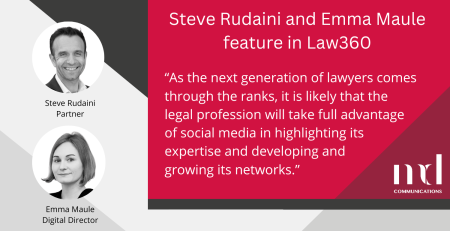Kevin Poulter, Partner at Freeths LLP, recently took part in our social media and reputation webinar. Here he discusses the sacking of Rebecca Long-Bailey after she retweeted an interview which Labour leader Sir Keir Starmer said contained an ‘anti-Semitic conspiracy theory’.
You can’t avoid the news that Rebecca Long-Bailey was ‘invited to step down’ from the Shadow Cabinet following the sharing of an article on social media.
The article itself, an interview with former professional barrister impersonator Maxine Peake, was already trending on Twitter by mid-morning. Although the article was on the face of it to promote a soon-to-be-released film, it was also said to contain an “anti-Semitic conspiracy theory” (since removed). You can follow the full saga here.
What has been apparent, though, is that the Shadow Education Secretary’s effective dismissal from the front bench has divided the Labour party, with some applauding swift and decisive action by new(ish) Leader Sir Keir Starmer and others viewing it as an overreaction and a way of dismissing a favourite of his predecessor. Indeed, it’s not unusual for a new boss to want to make their mark in a new team, but rarely are such decisions scrutinised by the national press.
But what of it? What can we learn from this distraction from COVID-19 (and the acute absence of Glastonbury 50)? Where social media is concerned, no two incidents are the same and, for that reason, a fair investigation is critical. An investigation provides an opportunity to collect information, consider both sides of a story and develop a considered response. The length of an investigation is often dictated by the nature of the threat and sometimes immediate action is required to limit potential damage.
Let’s look again at the current story and see what lessons we can learn:
Content and context: It could be argued that this is not really about what the offending article contained, but that would be missing the point. On this occasion it is absolutely about the alleged anti-Semitic theories within the article and the perceived promotion of such views by the sharing of it. Why? Because the boss was recently appointed on the back of a renewed commitment to the Jewish community. Context, too, is therefore vitally important. Many companies and brands will spend time, effort and vast sums promoting their ‘values’. If an employee acts in a way to undermine those values, they should be held to account.
Status: Like it or not, status is a key factor, whether that is status within an organisation, or status on social media. The higher up the corporate structure you are, the more likely you will be associated with your employer. The more followers you have, the greater reach (and responsibility) you have to those followers and those you represent. These may be unwritten rules, but they demand consideration. There is no doubt that, as a frontbench MP, Ms Long-Bailey held significant status, similarly with almost 170,000 Twitter followers (and a blue tick), she undeniably has some reach. And now this is front page news.
Other influence(r)s: Like many companies, a boss is answerable to others, whether that is a board, shareholders and consumers or a parliamentary party of members, stakeholders, MPs and the press. Without doubt, these are important considerations in any fair investigation, even if indirectly relevant to the alleged misdemeanour.
Policy: Social media policies can often be overreaching and self-defeating. When social media is used well, it can be hugely beneficial to organisations as well as individuals, but it is not enough to rely on common sense. Simple guidance (alongside training and good practice) alongside any sector specific code of conduct may be preferred. When enforcing a policy, it should be balanced alongside the right to independent beliefs, a private life and – social media’s favourite topic – free speech.
Crime and Punishment: Remorse and remedial action are important factors to consider. A post in error quickly deleted can be a lesson learned, but a reluctance to delete a tweet and take proactive remedial action shifts the offence from being excusable as a mistake, to challenging a request of an employer. In this case, the original tweet is still online and a battle of wills immediately followed. This leaves the decision-maker with little choice in response, though dismissal will rarely be the only option available.
For more discussion about the use of social media, reputation and representation check out a recent MD Communications discussion and blog post. You can also get a copy of the recent white paper: Social Media during COVID-19.
This guest blog was written by Kevin Poulter, Partner, Freeths LLP @kevinpoulter












